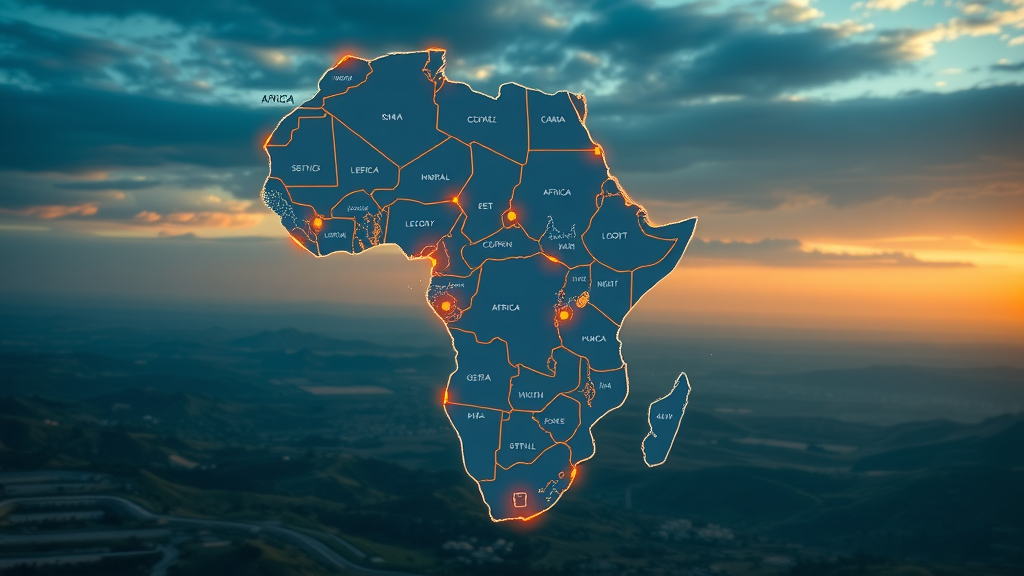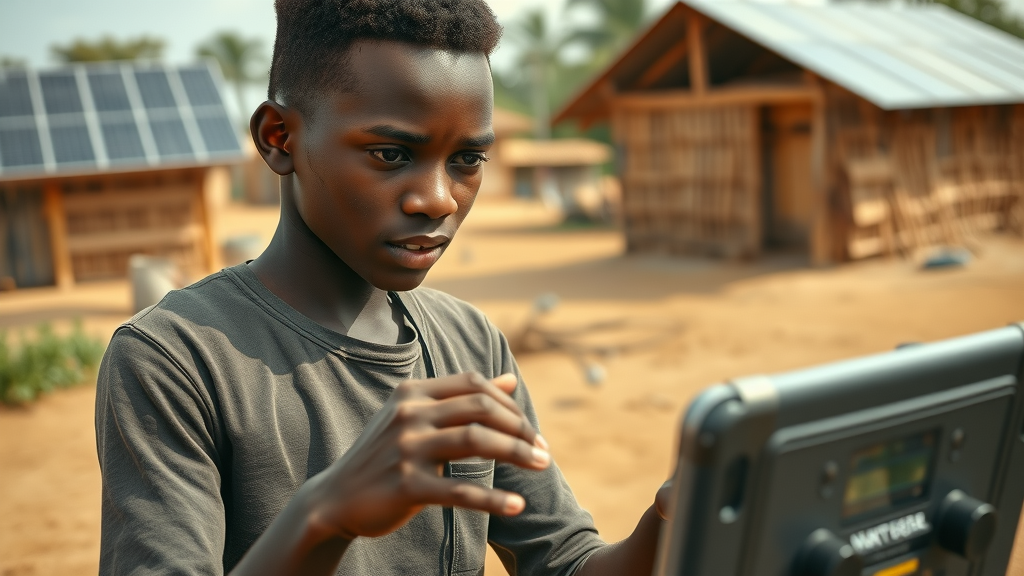By 2026, less than 3% of AI models are trained on African languages, despite over 2,000 languages spoken across the continent—a gap ripe with opportunity and risk.
What You'll Learn: This article explores why sovereign AI in African languages is a frontier that Africa cannot afford to ignore. Learn about the gap in AI development on the African continent, the role of language in AI sovereignty, pioneering models, and what the future holds for AI systems written for, and by, Africans. We’ll also examine key trends, address the most pressing challenges, and answer your biggest questions about this transformative digital shift.
Why Sovereign AI in African Languages Matters Now: An Urgent Perspective
The untapped potential of AI models in African languages is immense. Africa’s vast linguistic diversity—over 2,000 languages—contrasts sharply with the reality that less than 3% of global AI models are trained on any African tongue. Most AI systems dominating the global tech landscape are designed for Western-centric languages and contexts, making local African voices nearly invisible in technological progress. As AI infiltrates healthcare, finance, education, and governance, this disparity means that much of Africa’s wisdom, culture, and unique digital needs may go unserved or poorly understood by global AI.
The untapped potential of AI models in African languages
How sovereign AI shapes technological independence
The role of language in AI sovereignty and national identity
Why 2026 marks a pivotal year for Africa’s AI future
Sovereign AI offers far more than technical self-sufficiency. It’s about ensuring African data powers African solutions, protecting digital sovereignty, and putting the continent’s citizens and cultures at the center of emerging AI governance frameworks. With 2026 heralded as a critical year for AI advancement, African countries have a rare opportunity to leapfrog into the next digital frontier—if they seize the moment to invest in AI models that speak their own languages, respect local contexts , and prioritize Africa’s digital future.

Defining Sovereign AI in African Languages: Beyond Global AI Hegemony
Artificial Intelligence, Sovereignty, and the African Context
Sovereign AI in African languages means more than building new technology; it is a declaration of autonomy in the face of global AI hegemony. For centuries, African countries have relied on external innovation, often contending with systems that do not reflect their indigenous needs or realities. Now, with the rapid rise of AI development , nations are pushing back—seeking truly sovereign AI models rooted in their own languages and cultures, not dictated by foreign “one-size-fits-all” algorithms.
The African context presents both a challenge and a unique asset. By anchoring AI models in local languages, countries foster not just technical independence, but also strengthen national identity and unity in a way that imported systems cannot match. In this light, AI sovereignty is not only about data control or regulatory oversight; it’s about cultural power and the possibility of a digital future shaped “by us, for us.”
This drive toward sovereign AI also aligns with continent-wide ambitions to build homegrown tech champions—whether through public sector initiatives, local AI research, or supporting African data centers and startups. Africa’s vision is clear: autonomous, culturally attuned, and competitive in an increasingly AI-dominated world.
Decoding AI Models: Training Data, Language Diversity, and African Realities
At the heart of sovereign AI in African languages is the question of data—whose voices, whose stories, whose needs train our most powerful AI models? The dominant AI systems rely on vast repositories of text and speech data, largely in English, Mandarin, or European languages, leaving Africa’s rich linguistic tapestry largely invisible. This limits the scope, accuracy, and relevance of AI-powered solutions for millions of Africans.
African languages present unique challenges—and unique opportunities—for the training data that powers AI models. Locally sourced datasets ensure that language models understand regional dialects, slang, metaphors, and context. This is essential for building intuitive voice assistants, effective educational platforms, and relevant public services accessible to everyone, regardless of the language they speak at home.
By investing in high-quality, locally managed training data, countries ensure that their large language models reflect the values, conversational patterns, and lived realities of African people. This focus on language diversity isn’t just about inclusion—it’s an essential step toward equity in Africa’s AI-powered future.
Current Landscape: Artificial Intelligence Adoption and AI Sovereignty Initiatives in Africa
Regional Progress: East Africa and Emerging African AI Models
In the last few years, East Africa has become a beacon for sovereign AI innovation, thanks in part to the region’s dynamic tech ecosystem and vocal government support. Countries like Kenya, Ethiopia, and Rwanda are cultivating homegrown AI research labs, startups, and university programs dedicated to building models for African languages and contexts. Local AI models powered by Swahili, Amharic, and Somali are already revolutionizing sectors such as agriculture, financial inclusion, and public health—proving that African language technologies can deliver substantial economic and social impact.
In parallel, other regions are racing to catch up. West Africa’s NaijaGPT—supporting Yoruba and Hausa—has broken new ground in voice recognition and machine translation. In South Africa , language-specific innovations are driving safer, more accessible medical triage for rural clinics. Each project is a testament to the continent’s ingenuity, resilience, and commitment to AI sovereignty. These initiatives are backed not only by public funding, but also by an energetic network of tech communities and African talent within the growing diaspora.

Table: Notable AI Sovereign Projects—Country, Language, and Milestones
Country |
Project |
Language(s) |
Launch Year |
Milestone |
|---|---|---|---|---|
Kenya |
BantuAI |
Swahili |
2025 |
National NLP engine |
Nigeria |
NaijaGPT |
Yoruba, Hausa |
2024 |
Open-source release |
South Africa |
MzansiAI |
Zulu, Xhosa |
2026 |
Medical triage integration |
Overcoming Global AI Dominance: Why Sovereign AI in African Languages is Crucial for True AI Sovereignty
AI Sovereignty vs. Global AI: Risks of Overreliance on External AI Models
Depending solely on global AI systems exposes African countries to serious risks—from privacy breaches and cultural erosion to strategic dependency. When external models neither understand nor prioritize African languages or realities, there’s a danger of amplifying biases, excluding local users, and ceding control over vital infrastructure. There’s also the threat that multinational tech companies may prioritize their own commercial interests, ignoring the complexities and sensitivities of African societies.
In this climate, AI sovereignty is more than a trend—it’s a national imperative for countries wishing to protect their digital future. Homegrown AI models trained specifically on local languages and cultural codes can guard against data misuse, economic manipulation, and the imposition of foreign values. As governments build governance frameworks for AI development, the emphasis is shifting toward robust data sovereignty, transparent model training, and direct investment in local language AI research and talent.
Ultimately, achieving true AI sovereignty will require coordinated regional and continental strategies—blending political will, community advocacy, and cross-sector partnerships to reduce overreliance on outside tech giants.
The Paradox of AI Models Trained on Non-African Contexts
There’s a persistent paradox in the global rush for AI model supremacy: Western-centric training data has made AI tools universal, but also blind to many African realities. Models trained abroad often misinterpret local dialects, miss cultural references, or misunderstand the socio-political nuances encoded in African languages. This can lead to practical failures, from inaccurate translation to biased health diagnostics or exclusion from financial services.
What’s more, imported AI technologies risk discouraging the local development of african language models , perpetuating a cycle where African data is undervalued and underutilized. This undermines both economic autonomy and the rich cultural heritage embodied in African languages and oral traditions.
Building powerful large language models rooted in African data is our best remedy for bias and exclusion. These locally-trained AI models can provide more culturally relevant predictions, preserve endangered languages, and unlock the next generation of context-aware applications driven by african context.

Empowering Local Voices and Culture through AI Models Trained on African Languages
Preserving Linguistic Diversity: The Social Value of Sovereign AI
African societies are home to rich oral traditions, storytelling, and linguistic innovation. With so many languages at risk of extinction in the face of digital neglect, sovereign AI in African languages becomes a linchpin for protecting cultural diversity. Locally-trained AI models can help archive, revitalize, and expand endangered languages—making them accessible from digital assistants to educational platforms.
Beyond preservation, sovereign AI accelerates wider participation in the digital revolution. By recognizing accents, dialects, and informal speech, AI systems remove linguistic barriers and foster inclusion, ensuring people can access governmental, medical, and financial services in the languages they know best. The social value of this transformation cannot be overstated; it’s a catalyst for stronger national identity and pride, and helps unlock economic growth by connecting millions to global and local opportunity.
AI rooted in African culture also acts as a bulwark against digital colonization by embedding local stories, humor, and wisdom into the next wave of intelligent systems—thus telling our stories on our own terms.
Case Study: Impact of Swahili-Based AI Model in East Africa
One of the most compelling examples of sovereign AI in African languages is the Swahili-based AI model emerging from Kenya’s BantuAI project. Powered by local language data and a growing ecosystem of partners, this model now supports millions of people across Kenya, Tanzania, and Uganda. Applications range from voice-assisted learning to mobile banking and real-time health advice in Swahili—a tangible leap in digital inclusion.
Local businesses have quickly adapted the Swahili AI model for customer service, e-commerce, and agritech services, extending their reach to rural populations traditionally underserved by global AI solutions. Crucially, the model’s ability to switch between dialects and incorporate region-specific idioms is a breakthrough, setting a benchmark for future language models.
The BantuAI story demonstrates the power of contextually aware AI: community-driven, resilient, and deeply interwoven with the fabric of everyday life. It’s an inspiring case study, showing what’s possible when language, technology, and national ambition intersect for local benefit.

"If we don't build sovereign AI in African languages now, we risk erasing cultural nuances forever." — Dr. Jane Ogutu, AI Ethicist
Barriers to Developing Sovereign AI in African Languages
Data Scarcity and Infrastructure Challenges
Despite remarkable progress, sovereign AI faces systemic barriers. Chief among them is the scarcity of digitized, annotated language data—essential for training reliable AI models. With fewer novels, news archives, or government documents in local languages, many AI projects start at a disadvantage. Data collection in remote or rural areas is further hampered by unreliable connectivity, limited data center access, and infrastructure constraints, especially outside major cities.
Developers often rely on grassroots data gathering, crowdsourcing, and partnerships with community radio stations, teachers, and tribal elders to build up language corpora. While these efforts are creative, they are time-consuming, expensive, and sometimes face resistance due to privacy concerns or lack of digital literacy. For AI sovereignty to advance, robust investment in infrastructure, mobile data capture, and new approaches to distributed data centers will be vital.

Addressing these infrastructure challenges will not only make sovereign AI models more reliable, but also ensure their benefits reach every corner of the continent.
Funding, Talent, and Policy Gaps in African Contexts
Equally significant are the policy and resource gaps affecting AI development in Africa. The bulk of global tech investment still flows to established hubs, while emergent African startups and academic labs often struggle to secure seed funding, cloud credits, or high-performance computing environments. There’s a clear need for more deliberate policy frameworks supporting public-private partnerships, capacity building, and local ownership of intellectual property.
Talent remains a bottleneck, compounded by “brain drain” as top African AI engineers and data scientists are recruited by international firms. To counter this, countries must create incentives for skilled diaspora to return, and prioritize inclusion of young Africans in STEM careers from an early age. Without these investments in talent, a future built on sovereign AI risks stalling before it begins.
Governments, universities, and the private sector must work together to craft an enabling environment for innovation—one in which policy, funding, and education align to accelerate progress in African languages and AI sovereignty.
Success Stories: Pioneering Sovereign AI Models in African Countries
NaijaGPT (Nigeria): Launched in 2024, this language model has made Yoruba and Hausa conversational AI accessible to millions. Its open-source approach enables rapid improvement and localization.
BantuAI (Kenya): Swahili-powered BantuAI is the backbone of numerous East African voice technology startups and educational platforms, supporting both digital inclusion and economic growth.
MzansiAI (South Africa): MzansiAI’s success with Zulu and Xhosa models has improved public health triage and language-based AI for social services, empowering users in their native tongues.
Amharic NLP (Ethiopia): Building on local linguistic expertise, Amharic NLP projects have enabled text-to-speech, translation, and cultural documentation, fostering inclusion and knowledge preservation.
The Road Ahead: What the Future Holds for AI Models and AI Sovereignty in Africa
Predictions for the Rise of Sovereign AI in African Languages by 2026
By 2026, experts predict a surge in sovereign AI projects across at least 15 African countries, with new language models encompassing dozens of previously neglected languages and dialects. This growth will be fueled by a combination of improved infrastructure, more accessible cloud-based data centers , and continental investment in AI research hubs. Private sector competition, public sector mandates, and a growing sense of ownership over african data will accelerate innovation.
The coming years will also see expansion in digital public goods—open-source datasets, language corpora, and reusable frameworks—shared across borders to fast-track local AI development. As more citizens access services, education, and entertainment in their mother tongues, language-based AI will be a cornerstone of africa's digital sovereignty.
Africa’s leadership in highly multilingual, context-aware AI sets the stage for unique models of digital governance, cultural preservation, and economic resilience—serving as an example for other linguistically diverse regions worldwide.
Innovative Policy and International Partnerships to Advance African Languages
The path forward requires bold policy interventions and the forging of creative international partnerships. African governments are enacting national AI strategies, fostering multi-stakeholder governance frameworks, and investing in STEM education to build the capacity for sustainable AI innovation. International partnerships—both within Africa and with the global South—are bringing essential investment, knowledge sharing, and collaborative research capacity.
Programs such as AfricaNLP, AI4D Initiative, and collaborations between African universities and leading global AI institutes are helping bridge the digital divide. Through open licensing, scholarship opportunities, and research exchanges, these alliances empower new generations of AI builders fluent not just in English or French, but in their own languages—laying the foundation for a more inclusive digital future.

Which African country is leading in AI?
Kenya: East Africa’s Hub for Sovereign AI in African Languages
Kenya has established itself as a powerhouse for sovereign AI in African languages. Nairobi’s vibrant innovation hubs and strong government backing make it the center of projects such as BantuAI and Swahili-first voice tech platforms. Kenya’s universities and private sector partners drive sustained AI research focused on creating robust language models tailored for both regional and pan-African needs.
Outside coding circles, Kenya’s approach has inspired neighboring countries to prioritize local language AI, making East Africa a focal point for pan-continental knowledge sharing and collaboration.
This leadership is already paying dividends in sectors from agriculture to fintech and e-learning, as digital solutions built with the local context in mind deliver tangible value for citizens.
Who is the AI expert in Africa?
Influential Voices Shaping AI Sovereignty in the African Context
Africa’s AI landscape is shaped by a constellation of influential voices, each championing the cause of sovereign AI in their fields. Visionaries such as Dr. Vukosi Marivate (South Africa), who leads data science initiatives for indigenous languages, and Dr. Joy Buolamwini (Ghanaian-American), whose advocacy on AI bias has had global impact, are widely respected on the continent and beyond.
Grassroots leaders—like Dr. Jane Ogutu, quoted above, or Kenya’s Professor Bitange Ndemo—bring both technical expertise and social insight, ensuring that AI model development stays ethically grounded and community-focused. Their work is critical for building public trust and encouraging responsible AI governance.
These experts invest in mentorship programs, policy development, and cross-border collaborations—carrying Africa’s voice onto the global AI stage and shaping a digital future that is both inclusive and empowering.
Is there an African country that starts with the K-AI overview?
Kenya’s AI Model Landscape and African Languages
Kenya’s distinctive position in the sovereign AI ecosystem cannot be overstated. BantuAI, Code4Africa, and a vibrant open-source culture position the country at the heart of continent-wide AI innovation. Kenya’s model is rooted in rapid iteration, community-driven language data gathering, and strategic partnerships with regional universities and the private sector. The result: scalable solutions that work in not just Swahili, but regional dialects across East Africa.
This “K-AI” overview demonstrates a pragmatic path for other African countries—leveraging homegrown skills, diaspora expertise, and public-private collaboration to build relevant, impactful AI models grounded in local identities.
Kenya’s approach is already influencing AI education, public sector digital transformation, and the creation of multilingual AI-first businesses—reinforcing its reputation as an East African, and increasingly pan-African, leader.
What does AI mean for Africa?
Opportunities, Challenges, and the Unique African Vision for Artificial Intelligence
For Africa, AI offers both promise and peril. The opportunity lies in tailored technology: AI that understands local languages, solves community-level problems, and supports sectors such as precision agriculture, disease surveillance, and cross-border trade. However, AI’s benefits risk remaining out of reach for millions if development is driven only by imported ideas or English-language models.
Africa’s unique vision for artificial intelligence is grounded in solving real-world challenges—like expanding healthcare access in remote areas, building disaster-resilient systems, and supporting smallholder farmers with climate data in their mother tongue. This vision prioritizes inclusion, empowerment, and the preservation of African culture.
To fully realize this potential, Africa must overcome existing gaps in data, infrastructure, and skilled workforce. Importantly, the goal is not just to “catch up,” but to chart a path where AI sovereignty and self-reliance are the norm—not the exception.
"AI developed by us, for us, in our languages, could define Africa’s 21st-century digital sovereignty."
Frequently Asked Questions about Sovereign AI in African Languages
What is sovereign AI?
Sovereign AI refers to artificial intelligence systems that are designed, developed, and managed locally, reflecting the unique data, needs, and cultural values of a nation or region. For Africa, sovereign AI means taking control over the digital infrastructure, training data, and language models that will power future industries, rather than depending solely on global AI platforms.How are AI models built for African languages?
AI models for African languages are built using annotated text and speech datasets that represent authentic, context-rich language use. This involves collecting data from community contributors, digitizing oral literature, crowdsourcing translation, and leveraging local collaborations. Advanced machine learning and neural network techniques are then used to create systems capable of accurate translation, voice recognition, and natural language processing across diverse languages.What are the challenges with AI sovereignty in Africa?
Challenges include scarcity of high-quality language data, limited access to data centers and computational resources, insufficient funding, and a shortage of trained AI talent. Addressing these will require focused investment, new governance frameworks, and innovative partnerships—both locally and internationally—to help level the playing field in global AI development.
Key Trends and Lessons: What We Can Learn from Sovereign AI Models in African Languages
Investing in language-based AI is foundational for AI sovereignty
Developing local talent accelerates progress
Partnerships with diaspora yield innovation
Public sector buy-in is crucial
Dynamic short documentary highlighting breakthroughs in East African AI models, local innovation, and multilingual tech.
Join the Next Wave: Harnessing the Power of Sovereign AI in African Languages
Explore the frontline of innovation—discover more on Frontline Media Channels: https://east.africafrontlinemedia.com
Conclusion: sovereign AI in African languages
The development of sovereign AI models tailored to African languages is gaining momentum, addressing the critical need for linguistic diversity in artificial intelligence. For instance, Orange has partnered with OpenAI and Meta to create AI models that comprehend West African languages like Wolof and Pulaar, aiming to enhance customer support and public services in these regions. ( reuters.com ) Similarly, Google’s initiative to translate 31 African languages, including Dyula, Wolof, Baoulé, and Tamazight, into its platforms seeks to bridge language barriers and promote inclusivity. ( lemonde.fr ) These efforts underscore a significant shift towards empowering African communities through technology that respects and integrates their linguistic heritage.
 Add Row
Add Row  Add
Add 

Write A Comment